Just like most fledgling uprisings, the line between
success and failure rides on the razors edge.
History is filled with examples of ill-advised, Pyrrhic, and prematurely
executed attempts to gain freedom. The Easter
Uprising on April 24, 1916 was of no exception.
The Military Council of the Irish Republican
Brotherhood, which consisted of Eoin Macneill, Chief of Staff of the Irish
Volunteers, Patrick Pearce, James Connoly, Sean MacDermott, Bulmer Hobson,
Patrick McCartan, and John MacBride decided that it would be prudent to call
off the uprising and develop a better plan. During the planning meeting,
MacNeill had initially voiced concerns that it would not be the best time due
to an arms shipment from Germany abourd the Auld had been seized and would not
be arriving. Pearse and MacDermott eventually agreed at the meeting that the
fighting would be postponed until the time was right. The Military Council was
not unanimous in consent to hold off on the Uprising. Tom Clarke gave the most
passionate disapproval for the measure insisting that it go on as planed so the
movement for Irish Independence would not lose the momentum while the English
Military was busy fighting World War 1.
On Sunday, April 23rd, 1916, MacNeill, had an article
published in the newspaper the Sunday Independent that gave orders to members
of the Irish Volunteers, Citizens Army and the 200 strong female Cumann na mBan
to cancel the uprising.
No uprisings were planned on a whim. Even Hitler’s
Munich putsch was planned a year prior. Other than the Military Council, most
of which would not survive the Uprising, several perennial figures surround the
event. Countess Markievicz, oldest daughter
to an English baron and Arctic explorer, was a leader in the socialist Irish
Citizen Army and close associate of James Connolly. On January 19, 1916, Connolly disappeared for
three days and would eventually show back up at the Countess’ house with the
plan to go on ahead with the Easter Rebellion despite what certain more cautious
council members would say. He has
enlisted Pearse to calm any fears that MacNeill would have prior to the event. Prior to the seizure of the German weapons
shipment, the council had planned to have MacNeill unknowingly recruit and
mobilize for the uprising. As the plan for MacNeill shifted, Pearse leaked fake
documents to the council allegedly coming from the Dublin Castle, the British seat
of power in Dublin, which gave word that the weapons of the Irish Brotherhood
were to be seized. This was to bring a sense of urgency to MacNeill but he
instead, of course, advised more caution. In addition to the subterfuge with MacNeill,
Connolly and his associates went so far as to kidnap fellow councilman Bulmer
Hobson, so as to prevent him from compounding any opposition prior to the uprising.
Even though Connolly, Pearse, Clarke and even MacNeill’s
subordinates knew that they would more than likely be leading a failed coup. A failure
which would assure their deaths; they were prepared and welcomed becoming
martyrs. They had put all of their chips
on the fact that the British would completely over-react and in so doing shift
more public opinion to home rule and independence. They, of course, would
succeed. Everyone, save a couple on the
council, would eventually get their chance at martyrdom after the Easter
Uprising.
On Sunday, Captain George
Oliver Plunkett, commander of the Kimmage Garrison, had been convalescing in a
hospital outside of Dublin but discharged himself. The following day, Monday, April 24th,
Captain Plunkett marched his Soldiers to the train station and used his
revolver to flag down a trolley. He paid
for all of his 52 passengers, and then demanded that they be taken to the city
center. The first order of business would be to commandeer Dublin’s General
Post Office (GPO), a place that would be the headquarters for the rebellion for
the remainder of the week.
The instructions to abort the rebellion had
significantly reduced the numbers for the first day. Plunkett arranged his coterie in sections of
four, as was the standing order for the Irish Brotherhood, and marched them to
the GPO. British Army Garrison Soldiers
that were off duty lingered outside and were amused that the Irish were playing
at being Soldier. Plunkett who had to be
assisted off his horse ordered his men charge the GPO and clear everyone
out.
The British Soldiers stationed inside had been
completely taken by surprise and did not even have ammunition loaded in their
rifles. After a few shots at the ceiling
and a few bruised egos from the incredulous patrons, the GPO was cleared.
Pluckett’s Soldiers immediately took to fortify the building and place snipers on
the roof. By this time Pluckett had
begun to succumb to his illness and was visibly worn out from the exertion.
Pearse and Connolly walked out of the GPO together, and Pearse read the
following proclamation to a small audience of curious onlookers whose loyalties
to the event were decidedly mixed:
“In the
name of God and of the dead generations from which she receives her old
tradition of nationhood, Ireland, through us, summons her children to her flag
and strikes for her freedom.
Having
organised and trained her manhood through her secret revolutionary
organisation, the Irish Republican Brotherhood, and through her open military
organisations, the Irish Volunteers and the Irish Citizen Army, having
patiently perfected her discipline, having resolutely waited for the right moment
to reveal itself, she now seizes that moment, and supported by her exiled
children in America and by gallant allies in Europe, but relying in the first
on her own strength, she strikes in full confidence of victory.
We declare
the right of the people of Ireland to the ownership of Ireland and to the
unfettered control of Irish destinies, to be sovereign and indefeasible. The
long usurpation of that right by a foreign people and government has not
extinguished the right, nor can it ever be extinguished except by the
destruction of the Irish people. In every generation the Irish people have
asserted their right to national freedom and sovereignty; six times during the
past three hundred years they have asserted it in arms. Standing on that
fundamental right and again asserting it in arms in the face of the world, we
hereby proclaim the Irish Republic as a Sovereign Independent State, and we
pledge our lives and the lives of our comrades in arms to the cause of its
freedom, of its welfare, and of its exaltation among the nations.
The Irish
Republic is entitled to, and hereby claims, the allegiance of every Irishman
and Irishwoman. The Republic guarantees religious and civil liberty, equal
rights and equal opportunities to all its citizens, and declares its resolve to
pursue the happiness and prosperity of the whole nation and of all its parts,
cherishing all of the children of the nation equally, and oblivious of the
differences carefully fostered by an alien Government, which have divided a
minority from the majority in the past.
Until our
arms have brought the opportune moment for the establishment of a permanent
National Government, representative of the whole people of Ireland and elected
by the suffrages of all her men and women, the Provisional Government, hereby
constituted, will administer the civil and military affairs of the Republic in
trust for the people.
We place
the cause of the Irish Republic under the protection of the Most High God,
Whose blessing we invoke upon our arms, and we pray that no one who serves that
cause will dishonour it by cowardice, inhumanity, or rapine. In this supreme
hour the Irish nation must, by its valour and discipline, and by the readiness
of its children to sacrifice themselves for the common good, prove itself
worthy of the august destiny to which it is called”
Not
knowing the full scope of the uprising, the British Lancers on horseback had
been initially dispatched to clear out the GPO.
A call from the Irish leaders to not fire, (presumably to maintain the
moral high ground), was ignored. As the
Lancers began to get closer to the building, volleys of fire from Enfield’s quickly
cut down the Soldiers and their mounts and they retreated. A newsboy would collect the rifles and
ammunition the Lancers left behind and ave them to the Irish occupiers.
Word
quickly spread throughout the city and armed bands of British Soldiers and
Irish Constabulary would bump into the “Volunteers”, (a title they used for the
collective rebellion forces), and engage each other in small ambushes. To complicate matters, the Dublin slums
emptied for opportunistic looting and the city quickly spiraled out of
control.
The GPO
would withstand repeated assaults, largely due to the defense network and the
open fields of fire. With the exception of City Hall and a few other minor road
junctions and buildings, the Irish would be unable to capture any other key locations
of British government and dislodge the British Garrison from the city. During a night operation, the British entered
the City Hall through a back window and retook the building in a stealthy and
daring raid. All occupants were killed
or captured.
Fighting
during the Uprising is largely characterized by rooftop sniping and long range
gun battles as neither side was prepared for a direct urban engagement. The British, however, were able to use
machine guns and grenades to great effect against the Irish. The fighting on Tuesday would be constant and
brutal. Many of the Volunteers had fled
the city and it was left with the determined few to hold onto key road or buildings. In Stephens Green, the Irish had dug hasty trenches
and prepared to hold the ground. Of note
the Countess had been present at the Green to assist in digging trenches and fighting. Instead of an outright battle to clear the
area, the British placed machine guns at the top of a nearby hotel to the north
that overlooked the green. The British
were able to kill five and send the remainder fleeing to the nearby College of
Surgeons. Despite the setbacks, the
Irish were unbowed and sent out a telegraph to the world proclaiming that they
had held the city and today would be the birth of the Irish republic.
The River
Liffey, as it is called, intersects Dublin, and it was through here on Wednesday,
April 26, a British fishing protection vessel named “Helga” floated into Dublin
and opened fire with two large 18 pound cannons on the Custom House and Trinity
College. The destruction of the certain
parts of the city by the bombardment would be considerable and would deny the
Irish more key terrain.
2000 fresh
faced and brand new British Soldiers landed in Dublin with orders to clear the
streets. Their effects, however, were
quickly halted when they were ambushed and began taking considerable casualties
from coordinated fire from two different building. Eventually the British would
have to clear the buildings with a series of grenade attacks. Word eventually spread to the Volunteers of
the considerable casualties they were inflicting upon the British, but it was
obvious that they were not gaining any new ground that their supplies were
quickly being depleted.
Fighting on
Thursday would be even more desperate.
By the end of the day many of the Volunteers that still chose to fight
had either expended their ammunition and died in place or surrendered. Connolly was wounded in the ankle and was
able to make it to the GPO for medical care by a captured British Army
surgeon. Many parts of Dublin were
burning or had been destroyed by artillery.
The last fighting between the British and the Volunteers would be in
house to house clearing. The Irish would
knock down walls to enable them to move effectively from house to house.
By 3 P.M.
Pearse had surrendered to the British military authority, General Howe. Connolly had to be removed from the GPO by
stretcher and would follow Pearse to sign the surrender order. Plunkett led his Soldiers out of the GPO and
surrendered en masse. Fighting would go
on sporadically with 1st Battalion’s Ned Daly refusing to lay down
arms. The Uprising, however, had been
crushed and by Sunday the city was rebuilding.
Civilian casualties would be horrific.
An estimated 250 were killed and over 2000 had been wounded.
The
Countess would eventually be captured and was given a death sentence for her
part in the Easter Uprising. She would
eventually have that sentence commuted, and would take an active part in the Irish
Civil War and Irish politics. Eamon De Valera would also be spared death, largely
due to the fact that he was part American, (his father was actually of Cuban
decent). James Connolly was famously
executed while sitting in a chair (due to his leg wound). Thomas Clarke, Sean MacDermott, and John
MacBride were also executed that May.
Lesson 1:
Trust your friends, but verify.
Never turn
your back on crazy. MacNeill had been an
unwitting pawn, but by issuing the stand down order on Sunday, he stymied the
efforts to truly bring about a decisive victory on the first day of the
Uprising. Had the Irish been able to use the momentum of the victory at the GPO
to take more buildings unawares, they could have isolated Dublin Castle until
reinforcements arrived. Potentially,
they could have captured more of the Garrison and used that as a bargaining
chip. As it went, they had too few
Soldiers and too few weapons to ensure victory.
Also, if
your friends are quite serious about martyring themselves, you should believe them. If you are not into the murder-suicide thing
that characterizes martyrdom for political beliefs, it is probably
best to choose different friends.
Citizen Soldiers generally do not have any qualms about laying down
their life for something greater, like freedom from a tyrannical foreign government. What they would strongly disagree to is dying
for the sake of a body count.
Lesson 2:
Know the capabilities of your enemies and know your own.
The
British employed superior firepower from machine guns, grenades, a gunboat and
a armored cars to break the lines of the Volunteers. While the Military Council was quite aware of
how foolish the coup would be, the average Volunteer could not have known, at
least initially, how desperate their fight would be. Numbers of actual fighters
for the Uprising have the Volunteers outmatched by four to one. Additionally, most of the Irish Volunteers
would not participate in the hard fighting at the end of the week,
Lesson 3: Sometimes
you have to go through the rain to get to the rainbow.
After the
Military Council was destroyed, Puckett’s Aide de Camp, Michael Collins, would
pick up where they left off and would cause the British immeasurable grief to
great effect and without the martyrdom. Not
martyrdom by the British, at least. He
could not have had the opportunity to do so without the council destroying
itself and creating a power vacuum.
Lesson 4.
Always have a Plan B.
By Thursday, the Military Council discovered that they
were surrounded and that the same barricades that helped to defend their
positions were the same positions that helped to tighten the noose around them
and cut them off. The ability of the
British to envelope their positions could largely be from the fact that they had
16,000 Soldiers and 1,000 local police to work with whereas the Irish had on
1200 determined fighters. Had they
abandoned their positions by Wednesday, the Council would have remained largely
intact and it would not have been so costly in civilian deaths. Hindsight being what it is, the fact remains
that they did not allow for a Plan B, or a way out. I would consider that pretty important.
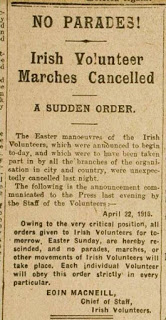
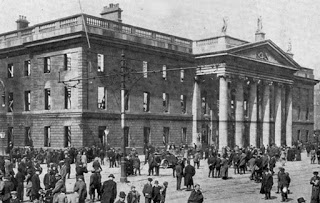
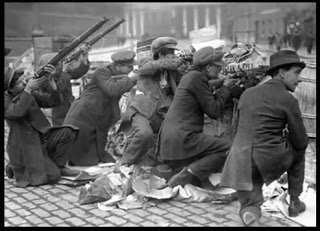
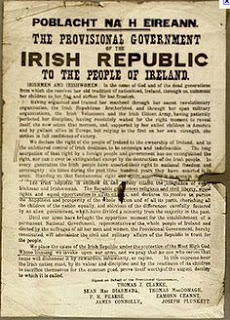
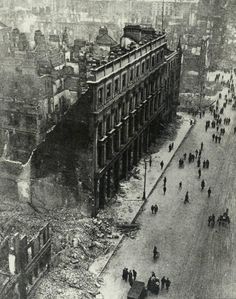
8 comments:
The salient point for me was the futility and arrogance of the effort at a moral level.
"The Irish Republic is entitled to, and hereby claims, the allegiance of every Irishman and Irishwoman."
What a preposterous bit of lunacy. There are universal principles that should claim the allegiance of every person of good will. There are particular issues or grievances the redress of which should claim the attention of all interested persons. But the Irish Republic? What is that?
I would add a lesson to those above, and I would put it foremost.
Have some kind of clearly defined cause worth killing and possibly dying to defend.
Chiu,
I am so happy that someone realized the 100th of the Easter Rising, Either you have not done your homework or, ... you are, perhaps , a black and Tan lurking about to re-write history.
"...futility and arrogance of the effort at a moral level"... spoken, by the opposition, about any or all failed rebellions, no matter how well intended, throughout history. We are talking the basic concepts of the Irish rebels 100 years ago. Yes, they were not all sold on the timing of the rebellion, or even rebellion indeed. Gotta think " But the Irish Republic , what is that?". AAaargh! what are you missing? Even the Ulstermen, give them credit as they (all) stood up for what they believed. Do you,sir, deep down, have any "clearly defined cause worth killing and possibly dying to defend"?
...James Connolly
I'm sorry if I seemed to be denigrating the importance of self-rule, which was a legitimate issue that shouldn't have taken nearly a century of futile bloodshed for the British to decide was a moral imperative they needed to recognize.
Nor can I approve of the conduct of the British authorities in either the heavy-handedness of the military response nor the extremely lopsided prosecutions that followed.
As to whether a paramilitary uprising/demonstration/occupation was a sound course to pursue at the time, I have to say that militarily it wasn't, though if it had been militarily sound, morally the limited action planned would have been justified by the history and contemporary refusal of Parliament to recognize and advance the principle of self-rule.
But the lynchpin of success or failure was, to a great extent, the question of whether many people (both Irish and English), and even those filling the trenches, understood what they were fighting to defend, and it wasn't some mere Irish nationalism...or at least, it shouldn't have been. If the principles expressed had transcended such a narrow nationalism, it might well have been possible to expand the insurrection beyond the ability of the British to resolve militarily, and even bring into question the fundamental moral duties of the responding authorities.
I picked out the salient element that should in no wise have appeared in a sober declaration of their cause, the one that may well be considered to have contributed more to the interminable nature of the following decades of conflict than to any real vision of what Irish independence was or ought to become. And I picked it to make a point about leading an effective insurrection.
It's not something I personally intend to do, but it is a pertinent concern for the III% community at large. Don't say stuff like "white men and women unite!" or even more ethnically narrow appeals, speak of things that apply to everyone who loves freedom.
Recognizing that not everyone does, and refusing to make that an excuse to try and make appeals that are fundamentally contradictory to freedom.
As for whether I have any clearly defined cause worth killing and possibly dying to defend, the answer is yes, but it is complicated by the fact that I ultimately desire to kill and die for reasons that are NOT generally applicable (part of why I don't seek to lead anyone). There is no reason to share them here (indeed, there are reasons NOT to do so). But I've also studied and endorsed the fundamental principles of freedom which are essential to a moral resistance to tyranny...and the proclamation of the Provisional Government of the Irish Republic managed to miss them by a margin that probably made a big difference in the event.
A mistake that might well have set back the cause of self-rule by decades and at a terrible cost in lives lost and ruined.
Lesson 5. Act at all times in such a way that your descendants will not turn out to be a group of back-stabbing, cowardly terrorist scum, a curse on the name of Irish Nationalism and the dupes of the Soviet Union.
John, the only way I know to follow that rule is celibacy till death. Not that there's anything wrong with that, but I wouldn't list it as an essential of properly planned resistance to tyranny.
Still, I hope I get what you're saying by interpreting it to mean establishing a clear moral standard for and by your actions, with which I must agree as imperfect as I am myself in practice.
Chiu:
OK, I see you have done your homework and I take back the suggestion about the Black and Tans. They were to come later and I should not have mixed two segments of history. I will have to wash my mouth out in good Irish whiskey. The Easter Rising has a great many lessons for us. It was a complex issue with many ideologies indeed. Perhaps, as I get older (heck I have been retired for years) and wiser (I find more nuances and facets in life), my view of history and the lessons to be taught come into better focus. The Rising should serve as a warning and the article was very good. Again I am so glad someone in the “blogosphere” recognized it.
When the cargo of the SS “Aud” was discovered by the Brits, the Volunteers jumped the gun (pun intended). Just about 100 years ago today, it was obvious their timing was off. Even before the 24th of April some realized this. The rebellion was a heck-of-a-way to get your likeness on postage stamps and statues. My personal favorite is the Countess. She predates the “little old ladies in tennis shoes”. Good boots and a revolver, damn, my kind of woman!
“Killing and dying” to me has such a terminal ring to it. I am of the old school “fight and die” terminology, though proverbial “fight to win” sounds better yet. We live in a very exciting time of history and would like to see this chapter play out.
I did notice in Ireland for the “Centenary” the reenactors of the Irish Volunteers had real rifles (though I suspect they were inactivated per State orders), but the Ulster Volunteers were “armed” with what appears to be wooden rifles. Considering the animosity still lingering (“Lesson 5”) that might be prudent. “Oh Sean, that wooden gune y’got thiar should make a moity foine cloob indeed”.
………..J. Connolly
Ah yes, Vanderboegh...a FINE old Irish name...
Good stuff, I reposted over at The Jolly Landsknecht with some comments. Keep up the good work!
JL
Post a Comment